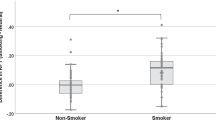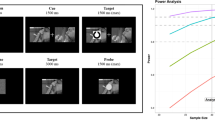Abstract
Rationale
Alcohol increases the motivation to smoke, possibly because it increases the incentive motivational properties of smoking cues.
Objectives
We examined whether alcohol would increase attentional, approach, and evaluative biases for smoking-related cues in a sample of daily cigarette smokers.
Methods
The study used a visual probe task with eye movement recording to investigate biases in visual orienting to smoking-related cues. A stimulus–response compatibility task was used to assess approach tendencies for smoking-related cues, and an explicit rating task was used to assess the perceived valence of smoking-related cues. Participants completed the tasks in two sessions, once after consumption of 0.4 g/kg alcohol and once after consumption of a non-alcoholic drink.
Results
Alcohol increased the maintenance of attention on smoking cues (evident from gaze duration and a reaction time index of attentional bias), the perceived pleasantness of smoking cues, and cigarette craving, relative to the non-alcoholic drink. However, alcohol had no effect on the initial shifting of gaze to smoking cues or on the tendency to approach smoking cues.
Conclusions
These results suggest that, in smokers, ingestion of a moderate dose of alcohol increases the propensity for smoking-related cues to hold attention and makes those cues seem more attractive, which is consistent with alcohol increasing the ‘incentive salience’ of smoking cues.



Similar content being viewed by others
References
Berg G, Laberg JC, Skutle A, Ohman A (1981) Instructed versus pharmacological effects of alcohol in alcoholics and social drinkers. Behav Res Ther 19:55–66
Bradley BP, Mogg K, Wright T, Field M (2003) Attentional bias in drug dependence: vigilance for cigarette-related cues in smokers. Psychol Addict Behav 17:66–72
Bradley BP, Field M, Mogg K, De Houwer J (2004) Attentional and evaluative biases for smoking cues in nicotine dependence: component processes of biases in visual orienting. Behav Pharmacol 15:29–36
Burton SM, Tiffany ST (1997) The effect of alcohol consumption on craving to smoke. Addiction 92:15–26
Caton SJ, Ball M, Ahern A, Hetherington MM (2004) Dose-dependent effects of alcohol on appetite and food intake. Physiol Behav 81:51–58
Cox LS, Tiffany ST, Christen AG (2001) Evaluation of the brief questionnaire of smoking urges (QSU-brief) in laboratory and clinical settings. Nicotine Tob Res 3:7–16
De Houwer J, Crombez G, Baeyens F, Hermans D (2001) On the generality of the affective Simon effect. Cogn Emot 15:189–206
Duka T, Stephens DN, Russell C, Tasker R (1998) Discriminative stimulus properties of low doses of ethanol in humans. Psychopharmacology 136:379–389
Ehrman RN, Robbins SJ, Bromwell MA, Lankford ME, Monterosso JR, O’Brien CP (2002) Comparing attentional bias to smoking cues in current smokers, former smokers, and non-smokers using a dot-probe task. Drug Alcohol Depend 67:185–191
Field M, Mogg K, Bradley BP (2004) Eye movements to smoking-related cues: effects of nicotine deprivation. Psychopharmacology 173:116–123
Franken IHA (2003) Drug craving and addiction: integrating psychological and neuropsychopharmacological approaches. Prog Neuro-Psychopharmacol Biol Psychiatry 27:563–579
Glautier S, Clements K, White JAW, Taylor C, Stolerman IP (1996) Alcohol and the reward value of cigarette smoking. Behav Pharmacol 7:144–154
Gross TM, Jarvik ME, Rosenblatt MR (1993) Nicotine abstinence produces context-specific stroop interference. Psychopharmacology 110:333–336
Harris RA, Brodie MS, Dunwiddie TV (1992) Possible substrates of ethanol reinforcement: GABA and dopamine. Ann N Y Acad Sci 654:61–69
LaBerge D (1995) Attentional processing. Harvard University Press, Cambridge, MA
Love A, James D, Willner P (1998) A comparison of two alcohol craving questionnaires. Addiction 93:1091–1102
Macleod C, Rutherford E, Campbell L, Ebsworthy G, Holker L (2002) Selective attention and emotional vulnerability: assessing the causal basis of their association through the experimental manipulation of attentional bias. J Abnorm Psychol 111:107–123
Mathews A, Macleod C (2002) Induced processing biases have causal effects on anxiety. Cogn Emot 16:331–354
Mehrabian A, Russell JA (1978) A questionnaire measure of habitual alcohol use. Psychol Rep 43:803–806
Mintz J, Boyd G, Rose JE, Charavastra VC, Jarvik ME (1985) Alcohol increases cigarette smoking: a laboratory demonstration. Addict Behav 10:203–207
Mogg K, Bradley BP, Field M, De Houwer J (2003) Biases in eye movements to smoking-related cues in smokers: relationship to affective and motivational valence. Addiction 98:825–836
Mogg K, Field M, Bradley BP (in press) Attentional and evaluative biases for smoking cues in smokers: an investigation of competing theoretical views of addiction. Psychopharmacology
Mucha RF, Geier A, Pauli P (1999) Modulation of craving by cues having differential overlap with pharmacological effect: evidence for cue approach in smokers and social drinkers. Psychopharmacology 147:306–313
Nil R, Buzzi R, Battig K (1984) Effects of single doses of alcohol and caffeine on cigarette smoke puffing behaviour. Pharmacol Biochem Behav 20:583–590
Posner MI, Snyder CR, Davidson BJ (1980) Attention and the detection of signals. J Exp Psychol Gen 109:160–174
Prokhorov AV, Pallonen UE, Fava JL, Ding L, Niaura R (1996) Measuring nicotine dependence among high-risk adolescent smokers. Addict Behav 21:117–127
Robinson KC, Berridge TC (1993) The neural basis of drug craving: an incentive-sensitization theory of addiction. Brain Res Rev 18:247–291
Robinson KC, Berridge TC (2003) Addiction. Annu Rev Psychol 54:25–53
Rohner JC (2002) The time-course of visual threat processing: high trait anxious individuals eventually avert their gaze from angry faces. Cogn Emot 16:837–844
Rose JE, Brauer LH, Behm FM, Cramblett M, Calkins K, Lawhon D (2004) Psychopharmacological interactions between nicotine and ethanol. Nicotine Tob Res 6:133–144
Sayette MA, Hufford MR (1994) Effects of cue exposure and deprivation on cognitive resources in smokers. J Abnorm Psychology 103:812–818
Sayette M, Shiffman S, Tiffany ST, Niaura RS, Martin CS, Shadel WG (2000) The measurement of drug craving. Addiction 95(Supplement 2):S189–S210
Schneider W (1995) MEL professional user’s guide. Psychology Software Tools, Pittsburgh
Shiffman S, Balabanis M (1995) Alcohol and tobacco associations. In: Fertig J, Allen J (eds) Alcohol and tobacco: from basic science to policy. National Institute on Alcohol Abuse and Alcoholism, Research Monograph #30 pp 17–36
Stewart J, de Wit H, Eikelboom R (1984) The role of conditioned and unconditioned drug effects in the self-administration of opiates and stimulants. Psychol Rev 91:251–268
Tomie A (1996) Locating reward cue at response manipulandum (CAM) induces symptoms of drug abuse. Neurosci Biobehav Rev 20:505–535
Acknowledgements
This work was supported by a University of Southampton Faculty Research Support Fund awarded to Matt Field. Karin Mogg holds a Wellcome Senior Research Fellowship in Basic Biomedical Science. We are grateful to Anneliese Day for help with running the study.
Author information
Authors and Affiliations
Corresponding author
Rights and permissions
About this article
Cite this article
Field, M., Mogg, K. & Bradley, B.P. Alcohol increases cognitive biases for smoking cues in smokers. Psychopharmacology 180, 63–72 (2005). https://doi.org/10.1007/s00213-005-2251-1
Received:
Accepted:
Published:
Issue Date:
DOI: https://doi.org/10.1007/s00213-005-2251-1




